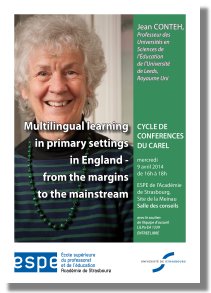 le mercredi 9 avril de 16h à 18h- Salle des Conseils à l'ESPE
le mercredi 9 avril de 16h à 18h- Salle des Conseils à l'ESPE Dr Jean Conteh is a Senior Lecturer and member of the Language Education research group in the School of Education at the University of Leeds (UK). Her interests in multilingualism and social justice come from her work as a primary teacher and teacher educator in different countries, and from returning to the UK from Africa with her own, dual heritage children and encountering a monolingual education system. She completed her PhD in 2001, an ethnographic study which investigated the factors contributing to the success of pupils from minority ethnic backgrounds in multilingual primary schools. Since then, she has published many books, chapters and articles about the issues, and continues to work with primary teachers and students. Her book, Teaching Bilingual and EAL Learners in Primary Schools, published by Sage in 2012, was shortlisted for the UKLA biennal academic book award. Her next major publication is an edited collection, The Multilingual Turn in Languages Education: Opportunities and Challenges for Individuals and Societies, to be published by Multilingual Matters in 2014.
Dr. Jean Conteh a travaillé comme professeur des écoles et en tant que formatrice d’enseignants en Sierra Leone, au Ghana, au Nigeria, au Pakistan, en Bulgarie et en Pologne. Pendant les 24 dernières années, elle a travaillé en tant qu’enseignante et formatrice d’enseignants à l’ouest du Yorkshire. Elle est à l’avant-garde dans le domaine de l’’anglais langue supplémentaire’, et travaille avec des élèves d’âge primaire qui parlent d’autres langues en plus de l’anglais. Pendant les deux dernières années, elle a été impliquée dans une variété d’activités en relation avec l’Agence de Formation et de Développement pour les Ecoles (TDA) dans le but de mettre au point les connaissances professionnelles des enseignants et des enseignants stagiaires concernant l’’anglais langue supplémentaire’ (EAL) dans le programme universitaire qui forme au poste d’enseignant.
Travailler dans des contextes multilingues dans de nombreux pays a renforcé sa prise de conscience de la façon dont les problèmes sociopolitiques affectent les chances de succès des enfants à tout niveau de leur éducation et lui a fait réaliser comment cette situation était liée tant à la culture qu’à la langue dans l’élaboration des connaissances en classe. Depuis qu’elle a achevé son doctorat en 2001, par l’intermédiaire duquel elle a enquêté sur les expériences d’élèves bilingues brillants (de 7 a 11 ans), elle a publié beaucoup de livres, de chapitres et d’articles sur ces sujets et n’a cessé de travailler avec des professeurs d’école et des enseignants stagiaires. Son livre publié en 2003 ‘Succeeding in Diversity : Culture, Language and Learning in Primary Classrooms’ (Réussir dans la Diversité : culture, langue et enseignement dans le primaire), raconte l’histoire de son travail de doctorat et de son impact sur la pédagogie. La recherche avec des enfants l’a fait réaliser l’importance de comprendre la relation entre les élèves et les professeurs. Depuis 2005, elle travaille avec un groupe de professeurs multilingues qui dirigent des classes ‘complémentaires’ dans le but d’améliorer la connaissance des enfants dans différentes langues. En 2011, ce groupe a reçu une subvention de la fondation Paul Hamelyn dans l’intention de développer ce travail avec ces enfants, leurs familles et leurs professeurs.
Currently, about 16.8% of pupils in primary schools in England are multilingual in that they speak other languages besides English at home (DfE, 2011). They are usually defined as ‘EAL’ (English as an additional language) learners. This term masks the complex history of language diversity and its constructions in the education system in England, which are still widely regarded as a ‘problem’ (Safford and Drury, 2013) by teachers and policy-makers. Over recent years, there have been many small-scale research studies (e.g. Conteh et al. 2013) which link multilingual primary children’s learning across the contexts of family, community and school. These reveal hopeful signs of the possible benefits for children’s achievement in mainstream school of integrating their ‘funds of knowledge’ for learning.
In my presentation, I will show some of the multilingual classroom practices that have been developed over the past ten years in a complementary Saturday class with primary-aged pupils in a city in the north of England. I will contextualise them in the local and national political, historical, cultural and social contexts in which the class is situated and in the ‘funds of knowledge’ concept of learning and the pedagogic model of ‘translanguaging’. My intention is to offer a different and more positive perspective from which to consider the problem that Safford and Drury identify. I will also offer some starting points for developing ‘multilingual pedagogies’ in mainstream contexts, in ways that could benefit all pupils, not just those who may be categorised as learning English as an additional language (EAL).
Conteh, with Riasat, S. and Begum, S. (forthcoming, 2013) Children learning multilingually in home, community and school contexts in Britain. In M. Schwartz and A. Verschik (eds.) Successful family language policy: parents, children and educators in interaction. Springer.
Department for Education (DfE) (2011) Statistical first release: Schools, pupils and their characteristics, January 2011 - Online document:
Safford, K. and Drury, R. (2013) The ‘problem’ of bilingual children in education settings: policy and research in England, Language and Education, 27 (1), 70-81.